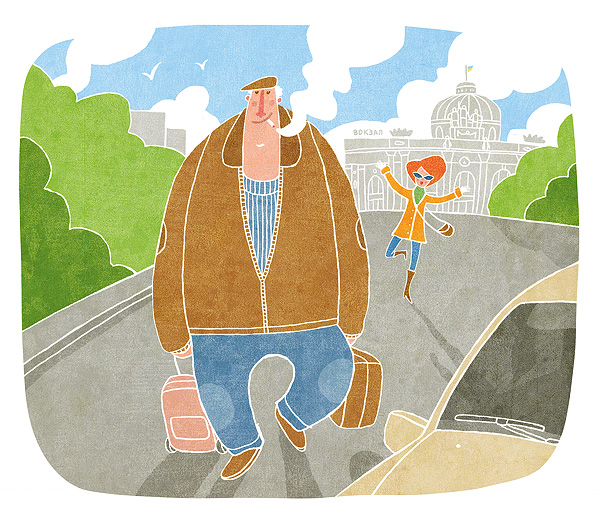My first attempt at being published took place in my mid-twenties. With some trepidation, I brought a lyrical sketch to the editorial offices of a Moscow newspaper. Since the sketch was just a couple of pages long, the literary editor read it in my presence while I attempted to stave off a panic attack.
“Well,” the man intoned upon finishing it. “It’s written well. But this is a newspaper here so we do need something topical. Something with a fighting spirit’.
He asked me some additional questions, trying to figure out who I was. Young and self-conscious, I forced myself to mumble something in response. I admitted that despite my day job as an engineer, I was quite keen on penning some literary sketches of the kind that I had just brought to show him. Having ascertained from my accent that I was a native of Odessa, he promptly figured out what to do with me.
“Well, why didn`t you tell me that in the first place? You should write a satirical piece for us!”
The only people who roll with laughter over the way Odessans talk are native Russian speakers. The grammar of Odessa speech is often asksnce, and the pronunciation sounds off kilter.
I was admittedly flummoxed by the proposal. Was simply being born and raised in Odessa enough of a qualification to become a satirist? Could it perhaps be because of those two Odessa writers, Ilya Ilf and Yevgeny Petrov? Published back in the late 1920’s and early 1930’s, their picaresque novels, The Twelve Chairs and The Golden Calf, chronicle the adventures of the witty con artist Ostap Bender. The books became Soviet cult classics and many of their best lines have long become part of Russian banter throughout the Russophone world:
“The business of saving the drowning is the business of the drowning themselves’’
“All the contraband of the world is produced on Little Arnaut Street in Odessa!”
“You didn’t evolve from monkeys like all the other citizens; you’re so thickheaded you must have descended from the cows”
“I’m not a cherub, I don’t have wings, but I respect the criminal code – that’s my weakness”
Then there were the larger than life gangsters in Isaac Babel`s Odessa Tales, who were simultaneously hilarious and romantic. It is a city that gave birth to scores of comic writers, as well as such famous entertainers as the cabaret singer Leonid Utyosov and the comedian Mikhail Zhvanetsky. So, while I have no scientific method to prove it, I do believe that the source of Odessan`s cheerfulness, optimistic outlook, and flamboyant lifestyle lies in the fact that the sun rarely abandons Odessa`s sky. The crystal blue water of the sea is warm year-round. Even the migrating Black Sea fish, all two hundred kinds of them, can’t help but jump out of the water and rejoice when they finally reach Odessa`s shore.
In the north of the country, under the gloomy skies, wrapped up in their overcoats, people tend to grow up to be introverts. In Odessa people wear their emotions on their sleeves and have no qualms in making their thoughts public. Shakespeare’s well known dictum that the whole world is a stage and that all people are merely actors playing their part is unquestionably true when applied to Odessans. With their temperament and lifestyle, the citizens of Odessa are tragicomic actors par excellence. Everything is for the show in this town. Everyday life is routinely exposed to the world’s gaze.
Just peek into any old Odessan courtyard if you require more proof. Overgrown with ivy and wild vines, which crawl over the cracked walls of the dilapidated buildings, the yards are haunted by a ceaseless babble of voices. The air is also pungent with an admixture of the most disparate odors. The perfume of the courtyard is a combination of freshly cooked borscht, roasted mackerel and boiled laundry. People live cheek by jowl here in tight spaces.
Privacy you ask? Forget it! Everyone here knows everything about everyone else. No one bothers hiding anything from the rest of the courtyard’s citizens. In such close quarters, secrets are impossible to keep and so no one burdens themselves with needless displays of etiquette or propriety. People step out of their rooms half-dressed without a second thought or walk into a neighbor’s apartment without knocking.
This is especially true of the life transpiring on the second floor of the building; that is on the circular gallery stretching around the courtyard. Everything is exposed to the outer world on that gallery. The people who live on the second floor hoist their kerosene stoves up to cook their dinner. Afterward, they will also consume it there, while loudly discussing family matters. They will prop their toddlers on their night pots and teach them good manners with the whole courtyard population observing and pitching in with input. When the yard is in a collective good mood, the gallery might fill up with song. They also have a tendency to swear and shout at the neighbors for real or imaginary acts of trespassing.
It will not be too long before a young woman dressed in her domestic robe, her wealth of hair knotted up in twist-ties and her face glistening with skin cream will appear on the plank-deck of the gallery. She is there to call home her unruly little son, who is deep in the joy of a child’s self-oblivion keeps running around the courtyard with his equally wild buddies. Yet instead of coming down to fetch him, the woman will stand on the balcony, and, not unlike some ancient Greek heroine, perhaps a Medea or Antigone, will turn her sight to the heavens and address simultaneously the gods and her courtyard neighbors. Her voice trembling with outrage, she will beg for our sympathy in her predicament. “Just look at that little scoundrel, good people!”
Still, she would certainly never stop at that in order to have us witness the biblical proportions of her suffering. This will be merely the opening line of what promises to be a twenty-minute monologue inviting the whole wide world to bear witness. She needs everyone to know what a miserable lot befell her—giving birth to that little rascal.
“You shouldn’t give birth to children!” she cries out. “You would be better off giving birth to stones!”
In Odessa, there are no taboos when it comes to laughter. The Russian proverb “For the sake of a witty word, he won’t spare even his father” fits nobody better than an Odessan. The city predisposition to humor is a byproduct of its history. From its outset, Odessa had become a melting pot of countless nationalities. Resorting to humor is the best way to ameliorate relationship between ethnic groups. And there were many of them. For a long time, French aristocrats, the fugitives of their revolution, planned, erected, and ornamented the city— men such as the Duc de Richelieu, Alexandre-Louis de Langeron, and Frantz de Volan. French city rulers, military leaders, architects, engineers, they all resided here with their servants and retinues for extended stretches of time.
Odessans are the French of Ukraine. And they are also the Ukrainians, hard-working, simple-hearted, but also a bit sly. Likewise, they are the industrious Bulgarians. The business-like Armenians. Or the stately Greeks. Pushkin Street was paved by the Italians, who inhabited it; in fact, it was named Italian Street. And, certainly, the Odessans are Jews, with their mistrustful, ironic, and down-to-earth attitude toward life.
Yet if Odessan speech is funny, this is for the most part unintentional. Many do not even suspect that something is wrong with their speech. The only people who roll with laughter over the way Odessans talk are native Russian speakers. The grammar of Odessa speech is often askance, and the pronunciation sounds off kilter. The reason for it is that, by and large, the Russian of Odessans was the language of the immigrants who populated the city from the time it had been founded, at the end of the eighteenth century. For several generations of inhabitants, Russian was an acquired language. The newly shaped Odessa lingo was forged from a Russian lexicon sprinkled with Gallicisms and spiced up with Ukrainian prepositions. These were often inserted out of place (“I won’t tell you for [instead of about] all Odessa”), and infused with the rhetoric and phraseology of Yiddish.
The peculiarity of the semantic twists and differing registers of the Odessan language owe their comic effects to its immigrant roots, to the language learner’s first clumsy attempts in constructing a phrase
As the city came into being, Catherine the Great invited Jews from all over the Pale of Settlement to work in European grain trade. Along with the Yiddish inflected vernacular, the city also inherited a dash of the Jewish humor, that gave it sardonic streak. Sarcasm and irony were always the signature mode of Jewish self-expression. So, it should be unsurprising that many `Odessisms` are mere carbon copies of Yiddish expressions. To this day the Odessa variant of Russian `Yinglish` is sprinkled with dismissive epithets like schmendrik (a nincompoop), schmuck (a jerk), schweitzer (a busybody), schlimazel (down-on-luck man), and schlemiel (a loser).
As a result of the influx of people arriving from the dying shtetlach of Ukraine and Byelorussia between the October revolution and the mid-1930s, Yiddish often became the language of class instruction in many Odessan schools. Newspapers, magazines, and books published in Yiddish could be purchased in any kiosk. In many areas of the city, even judicial proceedings were conducted in the language of Sholom Aleichem. A patrolling policeman might be heard shouting: “Do you want those cars tsykvetch, to crush, you to death?” at an absent-minded jay walker. It is also to this time that we can trace the popular parodies of the rules of public behavior in Odessa banter. For instance, a warning sign above a streetcar window, “Avoid leaning out,” might be turned into “Go ahead, stick yourself out! We’ll see what’s left of you!” “No riding without a ticket” becomes “May you reach that destination for which you bought your ticket!”
For the first generation of Jewish settlers, the Odessan language became the language of displaced persons, the language of migrants compelled to master a new and particularly difficult Russian language in a hurry. In the following generations, this language reproduced itself, becoming a normative language even of those who didn’t know language of their ancestors. Expressions such as “May you be healthy for me!” “Listen over here!” “Do you hold me or [instead of take me for or consider me to be] an idiot?” and “Have [instead of keep] me in your mind” are simply word-for-word translations of Yiddish phrases.
Many expressive phrases deployed amid flashes of strong of emotion – anger, frustration, or anxiety – saturate Odessan speech. “He dies after her” (that is, he loves her to death) is of the same origin. Many Odessan curses and folk damnations also derive from Yiddish: “May my mama give birth to me in reverse order!”, “You’re a chunk of an idiot!”, “May you live on your salary alone!”
The peculiarity of the semantic twists and differing registers of the Odessan language owe their comic effects to its immigrant roots, to the language learner’s first clumsy attempts in constructing a phrase. It is a strategy to which immigrants all over the world hastily resort in order to root themselves in a new language. An Odessan is usually not trying to crack a joke when he pays this sort of compliment to a lady: “Mrs. Kantselson, today you look out wonderful!” Or when he says to his neighbors, “Please tell my wife that I’ve gone to take away our child from the kindergarten.” A very common mistake was not comprehending the difference between vyglyadet’ (to look) and vyglyadyvat’ (to look out) as well as between vzyat (to take) and zabrat’ (to take away).
In Odessa, there are no taboos when it comes to laughter. The Russian proverb “for the sake of a witty word, he won’t spare even his father” fits nobody better than an Odessa
If finding himself stumped for words, an Odessan might resort to those that he already knew in the new language. Thus, instead of “She’s an attractive woman,” he might say, “She’s not an ugly woman.” In the Odessan’s mangled Russian, the simple and easily remembered words for “yes” and “no” are made to work to their full capacity and to handle multiple forms of complexity. Instead of “This is an exception to the rule,” in Odessa they have a habit of saying, “Generally, yes. But in this case—no!” Odessans also have a habit of turning the question “Can you answer me definitely, yes or no?” into “Now tell me already: ‘yes’ is ‘yes’ or ‘yes’ is ‘no’?”
Such lexical simplification would very often bring unexpected results and so Odessan speech is archetypically sparkling, unusual, and funny. Thus, where a native Russian speaker might say, “Don’t stuff my head with all kinds of nonsense! My head’s bursting,” an Odessan expresses himself more succinctly: “Don’t make my head pregnant!” An Odessan might transform the typical parental admonition “Why don’t you listen to your papa?” into “Am I your papa or what?”
Odessan humor is the humor of the impatient. It is the commonsense needling of rigid rules and mockery of needless formality. A classic joke about catching a taxi illustrates this dynamic:
At the Odessa railroad station, a woman who has just arrived from Moscow tries in vain to catch a taxi. Jingling his ignition key, an Odessan moonlighting as a private taxi service approaches her. Without saying a word, he picks up the Moscow lady’s suitcases and takes them to his own car.
“Wait a minute, wait a minute!” the newly arrived lady shouts after him. “That is not a taxi! I need a taxi.”
“Lady!” The Odessan riposted “I don’t understand you! What do you need? A ride or checkers?”
All this humor is unintentional, borne of the act of bursting through the limitations of linguistic constraint.
Another quality related to the migrant mentality captured in Odessan speech is the subconscious resistance of people who have escaped from a small and secluded world and revolted against the regulations of a new system that contradicts their expectation of unbridled freedom. For those who migrated from the villages or the shtetlach into the urban environment, Odessa was a legendary Promised Land on par with America. To the migrants from the countryside, Odessa`s streets also seemed to be paved with gold and encrusted with diamonds. Odessan humor is the humor of the impatient.
As one Odessa tailor retorted to a harried customer who was demanding an expedited order:
‘’Tell me my good man, what exactly do you want: a quick job or that your jacket sleeves be of equal length?”
Emil Draitser is author and professor of Russian at Hunter College in NYC. This essay is adopted from his memoir-in-progress, To Laugh or Not to Laugh: Writing Satire in Brezhnev Russia, a sequel to his book, Shush! Growing up Jewish under Stalin. His most recent book is Na Kudykinu Goru (From Here to Wherever): A novel of Odessa.




































